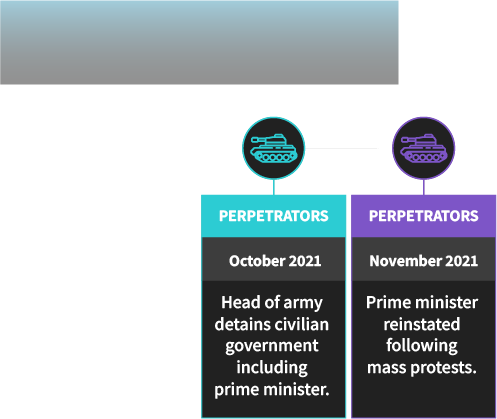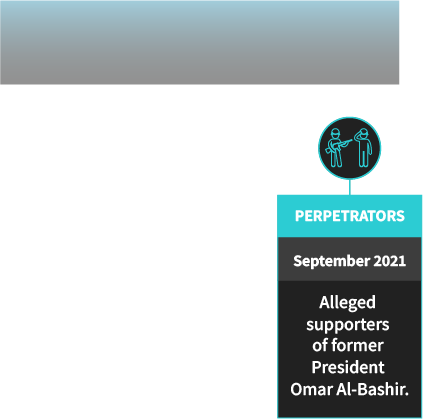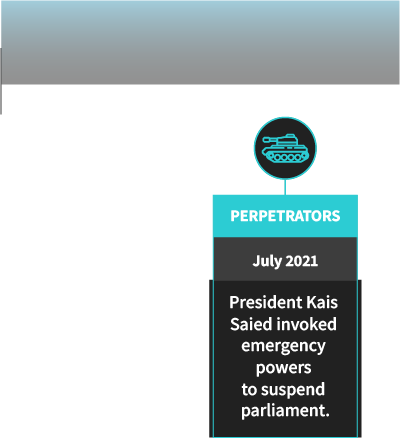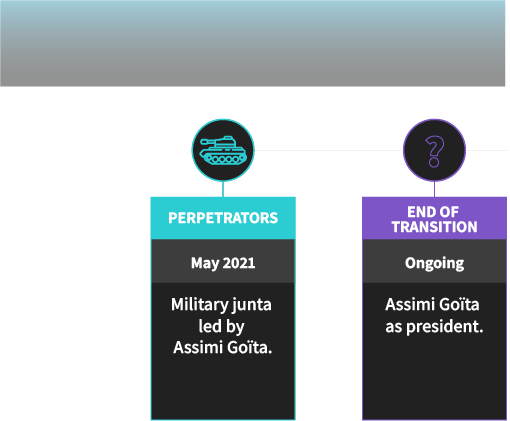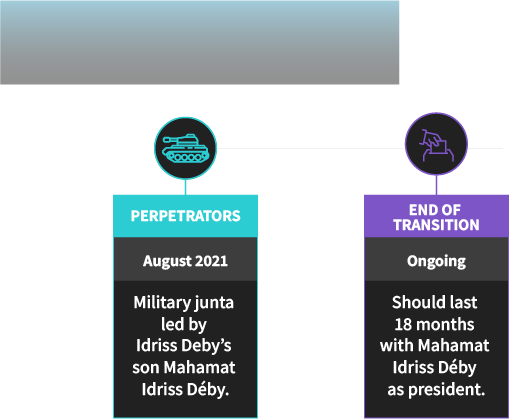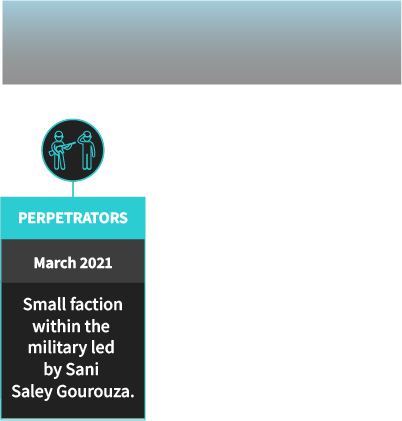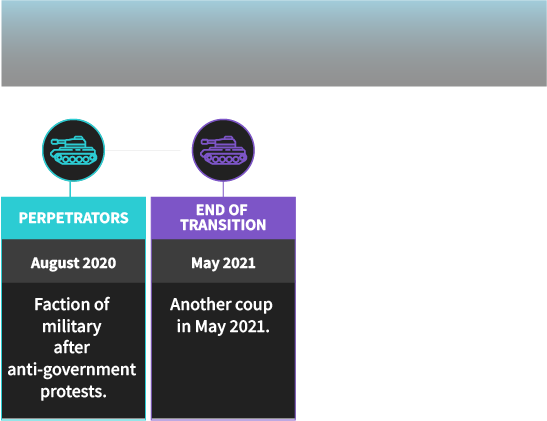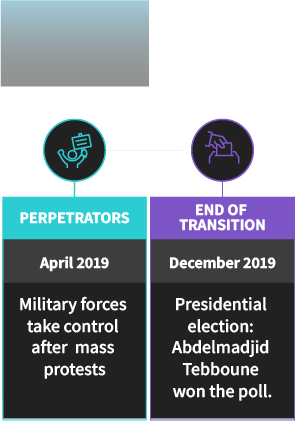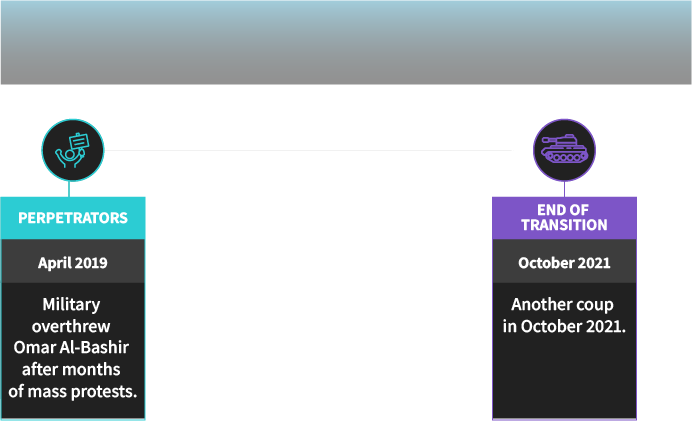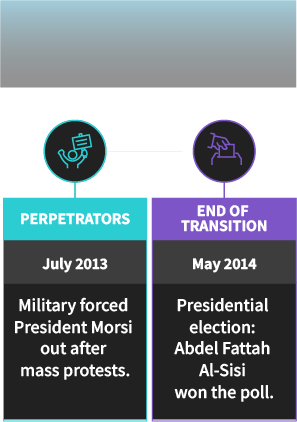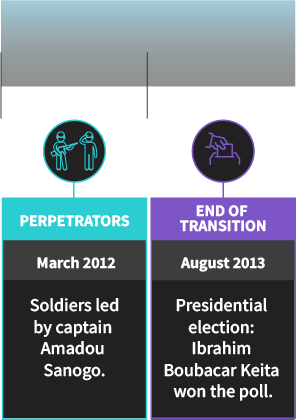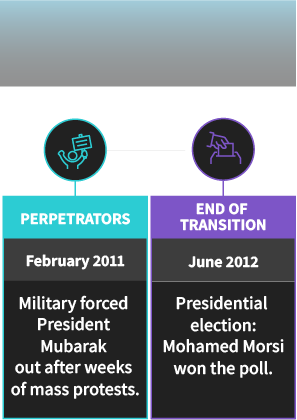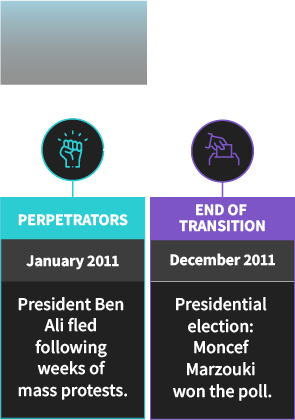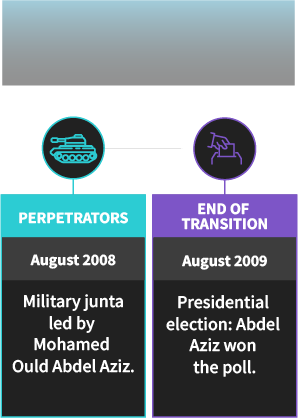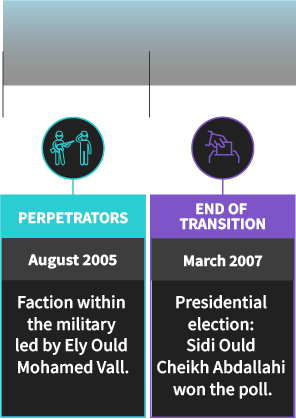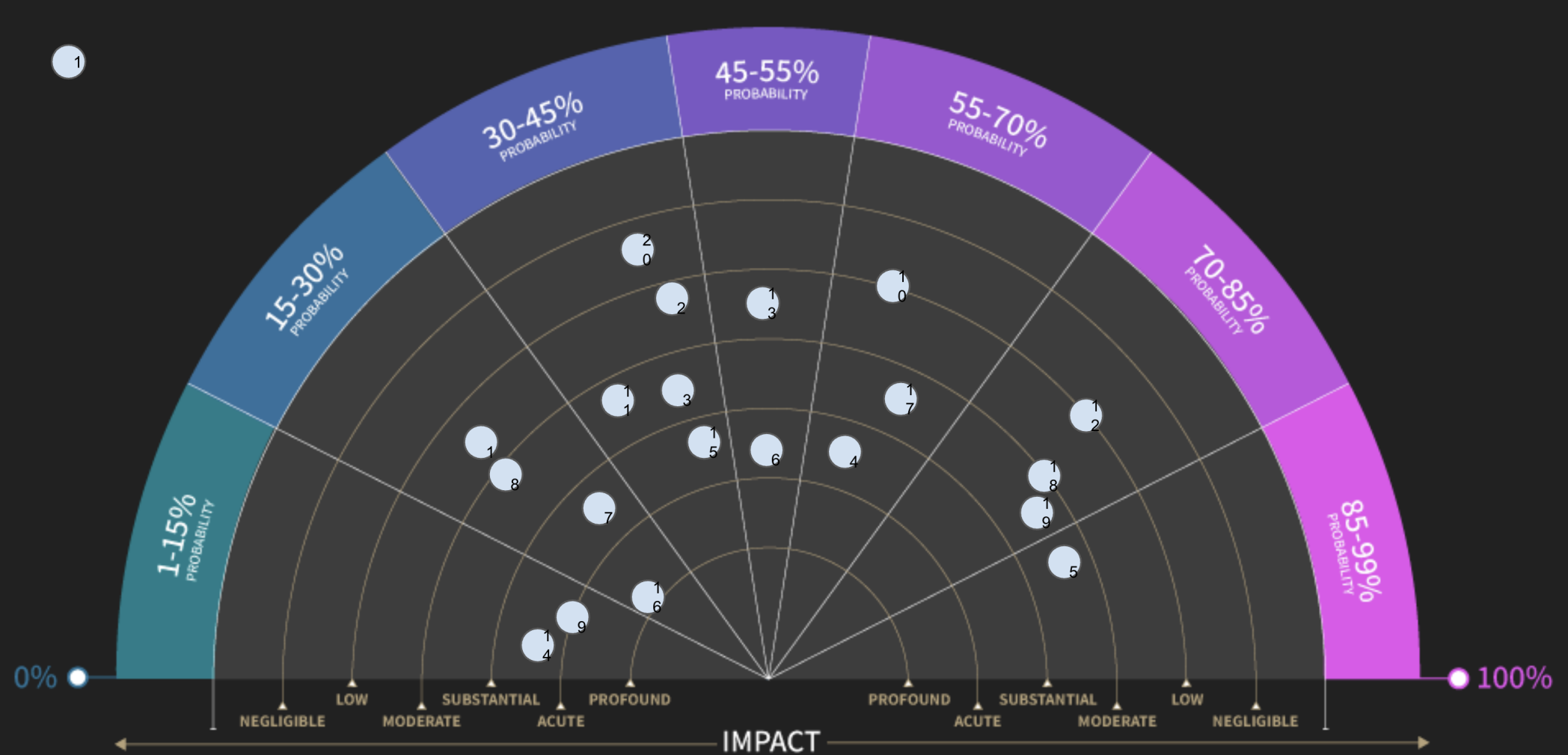The power of generals


The relationship between civilian government and military agencies is in a state of flux in most countries in the region, with the militaries keeping the upper hand.


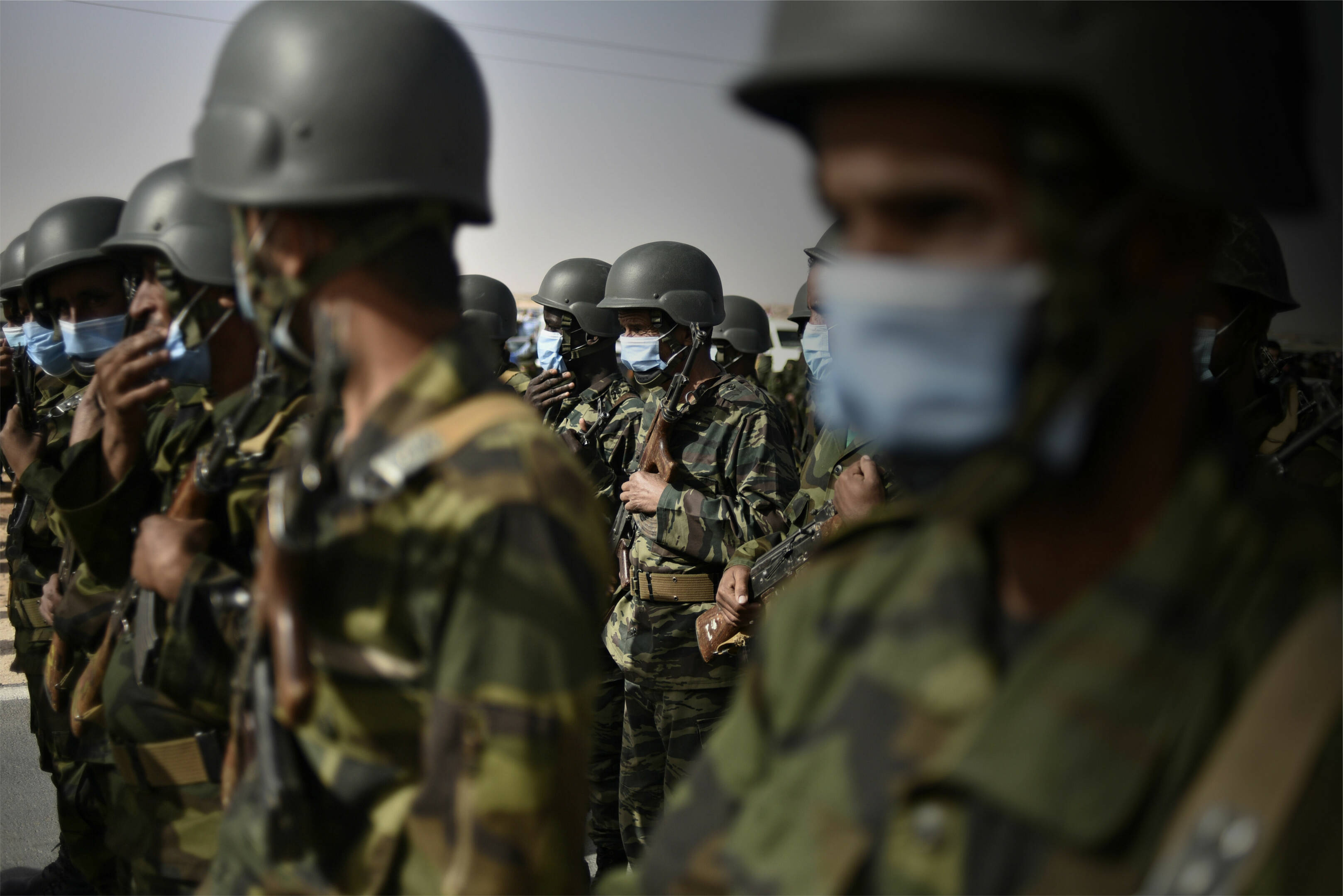

North Africa
Dates to watch
Key indicators

Military exercises and deployments to borders
There are a few developments that would suggest risks of direct inter-state armed conflict over disputed issues including the GERD, Western Sahara and Libya are rising. They include Ethiopia alleging that Egypt is directly engaged in its civil conflict, a cross-border attack in Morocco or Algeria resulting in civilian casualties, and large numbers of Libyan fighters moving eastwards towards Egypt. On the other hand, moves towards regional reconciliation including a resumption of negotiations over the GERD and Morocco-Algeria upgrading their diplomatic relations would signal that inter-state conflict risks are falling further.
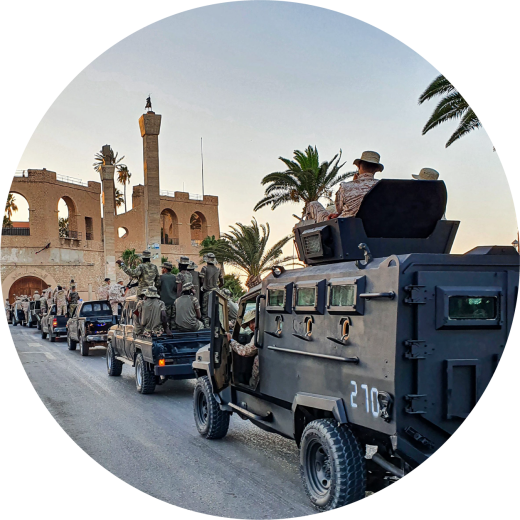
Fragile stability in Libya
There are several political and military developments that we anticipate would signal that the fragile political process in Libya is likely to imminently break down and result in a resumption of civil conflict. These include armed attacks or violent protests against the electoral authorities in the aftermath of the December 2021 vote and political factions withdrawing from cabinet or the process to form that. We will also be monitoring for softer indicators that point to domestic and international concern about a potential collapse. These include political figures relocating abroad, people moving their money abroad, and crisis meetings by UN and regional diplomats.
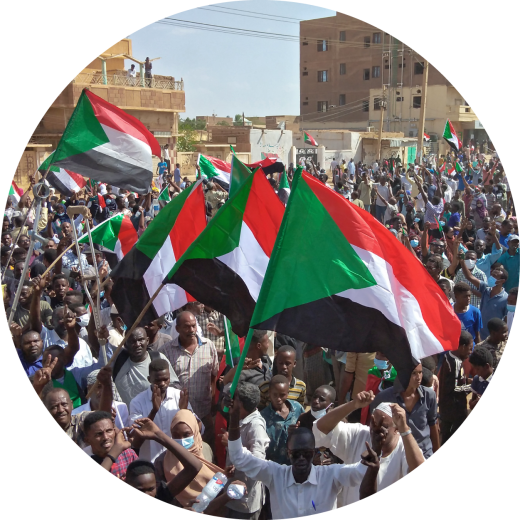
Destabilising protests against military authorities in
Mali and Sudan
With ongoing political transitions in Mali and Sudan we will be monitoring several indications that civil-military relations are deteriorating significantly. These would portend a heightened and imminent risk of another coup or other major political crisis. Large-scale, violent protests that are disruptive to day-to-day life in Khartoum and Bamako over several weeks would be particularly likely to lead the armed forces or a faction of them to intervene. As well as hardship and serious delays to the transitional timetable, a mass-casualty incident, such as a cross-border attack, communal violence or a major terrorist attack that highlights security failings would be particularly likely to trigger such unrest.











KEY
Military coup after popular uprising
Coup by rival military faction
Ongoing
Another military coup
Election
Military coup against civilian government
Revolution

2014-2018
2009-2010
ONGOING
2021
2020
2019
2013
2012
2011
2008
2006-2007
2005
History repeating itself

CLICK ON COUNTRY NAMES FOR DETAIL
States in North Africa and the Sahel have experienced repeated waves of instability over the last decade or so. The upheaval of the Arab Spring in 2011 persisted for several years, but was finally extinguished as the Egyptian army once again took control in 2013.
And now history is repeating itself. Militaries across the region have stepped in to ride waves of unrest, remove civilian leadership and enforce transitional political processes, ostensibly intended to usher in democracy. But ultimately, it is the generals who remain in charge.

Risk dashboard
Infographic
Assessment
Forecasts
Dates to watch
Key indicators

The power
of generals
The militaries of the region will play a central role in determining the political and security outlook in North Africa in 2022. The region faces multiple challenges with continuing instability and insecurity, particularly in Libya, Sudan and across the Sahel.
The outlook for economic recovery for those countries is strongly negative. For the rest, the lingering impacts of the pandemic and associated contractions in key sectors such as hydrocarbons and tourism means their recoveries are highly vulnerable to setbacks, such as renewed Covid-19 outbreaks.
The economic toll of the pandemic on the region is highly significant in terms of stability and security risks, and the potential for governance-induced crises over the long term. The economic resilience of all countries, including Egypt, its highest performer in terms of GDP growth, has diminished. The average fiscal deficit for Egypt, Libya, Tunisia, Algeria, Morocco and Mauritania, as the region’s leading economies, has doubled. This renders them vulnerable to social discontent and gives governments few means to redress grievances.
Compounding these challenges is the likely inability of civilian governments to exert influence over powerful military and security agencies in most countries in 2022. There appear to be scant prospects for democratic reform across North Africa, even if there are moves to liberalise economic sectors as seems likely, for example in Algeria. This deepening authoritarianism and the protection of vested military interests suggest any threats to stability will be robustly dealt with under the pretext of necessary measures to recover the economy. >>
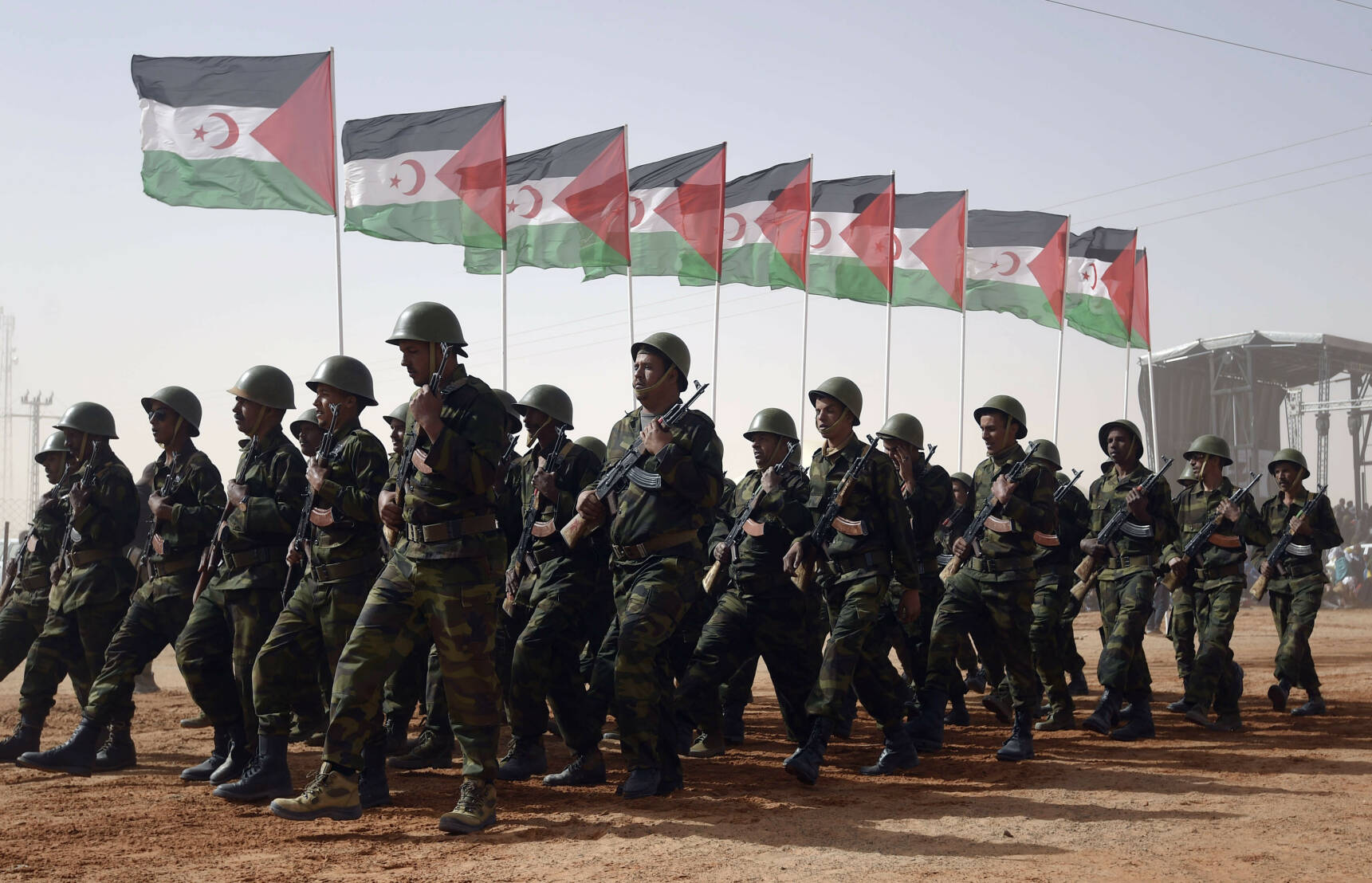
Images: Getty Images (Ryad Kradmdi/AFP; Faroul Batiche/AFP; Fadel Senna; Mahmud Turkia; AFP)
Scroll down
North Africa
Start of Ramadan
2 April
North Africa
Eid Al-Adha
9 July
Egypt
Anniversary of overthrow of Mohamed Morsi
3 July
North Africa
Eid Al-Fitr
2 May–3 May
North Africa
End of Ramadan
1 May
Sudan
Anniversary of overthrow of Omar Al-Bashir
11 April
Niger
Concord Day - Commemorating 1995 peace accord signing.
24 April
North Africa
Earth Day
22 April
Algeria
Anniversary of start of war
of independence
1 November
North Africa
Annunciation Day
25 March
Algeria
Arab League Summit
March
Mali
Legislative and
presidential elections
27 February
Algeria
Anniversary of the start of 'Hirak' protest movement
22 February
Egypt
Anniversary of the start of 2011 protests
25 January
Tunisia
Anniversary of revolution
14 January
North Africa
Ashura
7 August–8 August
North AFRICA
Rainy season
November–March
China / Hong Kong / Macau
National Congress of the Chinese Communist Party
8 November - 11 November
Australia
Rainy season in Northern Australia
December - March
Indonesia
G20 Summit in Bali
Before December
China
BRICS summit
Before December
Thailand
Asia Pacific Economic Cooperation Summit
Before December
Cambodia
East Asia Summit
Before December
Cambodia
ASEAN Summit
Before December
Tonga
Rainy season
November - May
Morocco
Anniversary of the Green March to Western Sahara
6 November
Fiji
Rainy season
November - April
Fiji
Legislative elections
November
Taiwan
Taiwan Retrocession Day
25 October
Tunisia
Francophonie Summit
in Djerba
Before December
North Africa
African Union Summit
Before December
Egypt
COP27 in Sharm El Sheikh
7 November –18 November
North Africa
Orthodox Christmas Eve
6 January
CLICK ON FLAGS TO
SHOW INFORMATION




















Forecasts
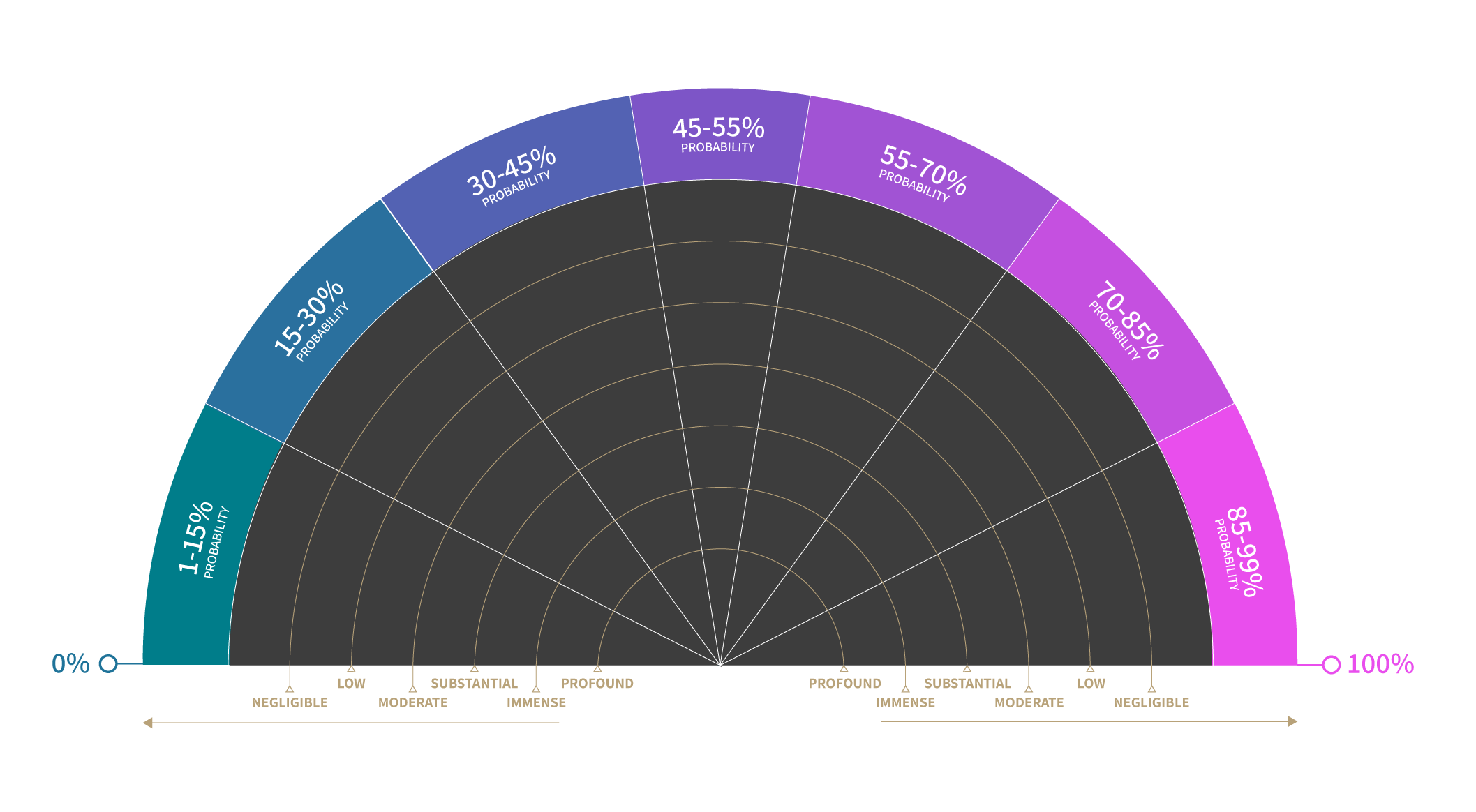
The power of generals


The relationship between civilian government and military agencies is in a state of flux in most countries in the region, with the militaries keeping the upper hand.



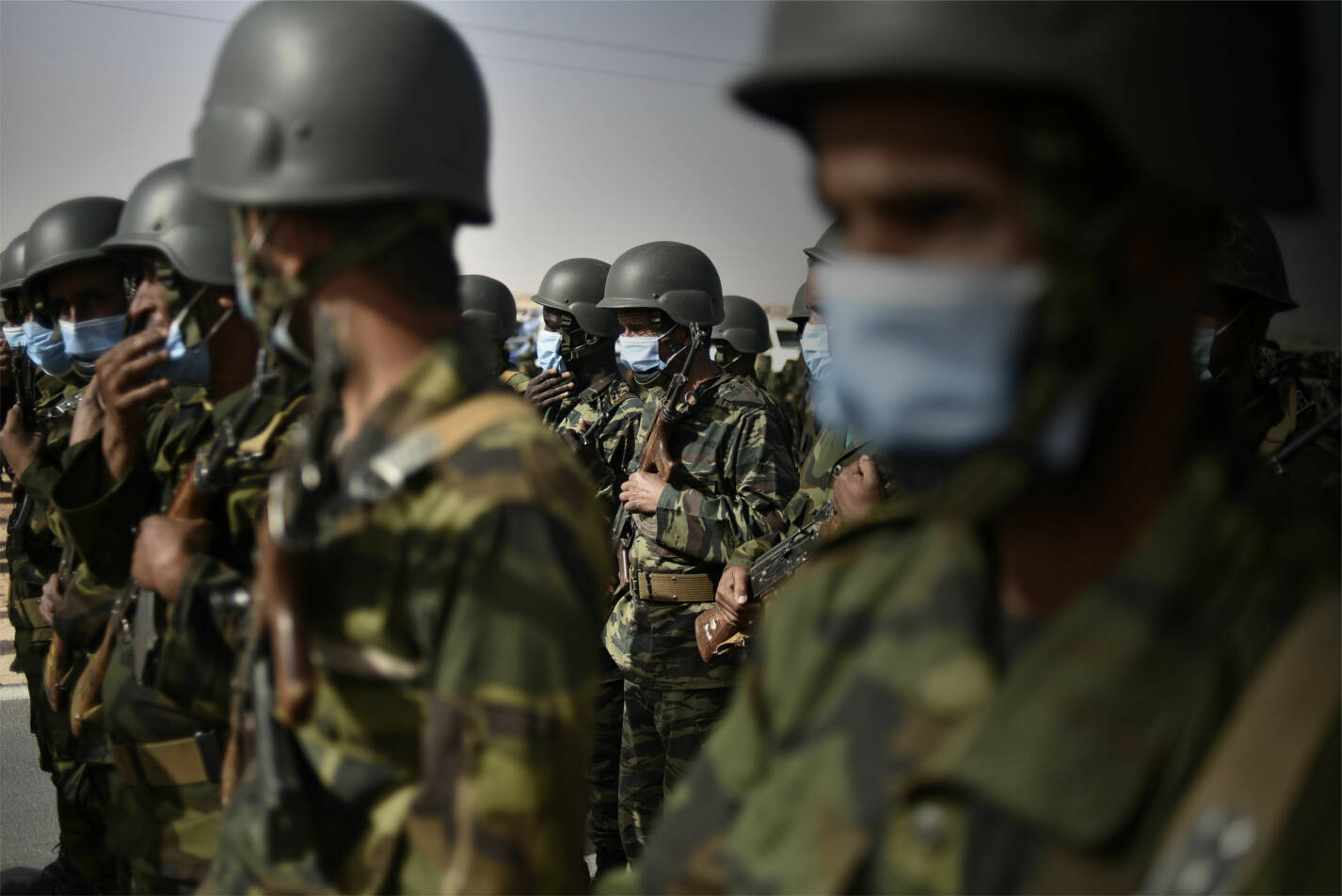
States in North Africa and the Sahel have experienced repeated waves of instability over the last decade or so. The upheaval of the Arab Spring in 2011 persisted for several years, but was finally extinguished as the Egyptian army once again took control in 2013.
And now history is repeating itself. Militaries across the region have stepped in to ride waves of unrest, remove civilian leadership and enforce transitional political processes, ostensibly intended to usher in democracy. But ultimately, it is the generals who remain in charge.


For best results
We recommend that you view this in a desktop browser. If using a tablet or smartphone, some infographics may only respond to device-specific gestures.
Forecasts
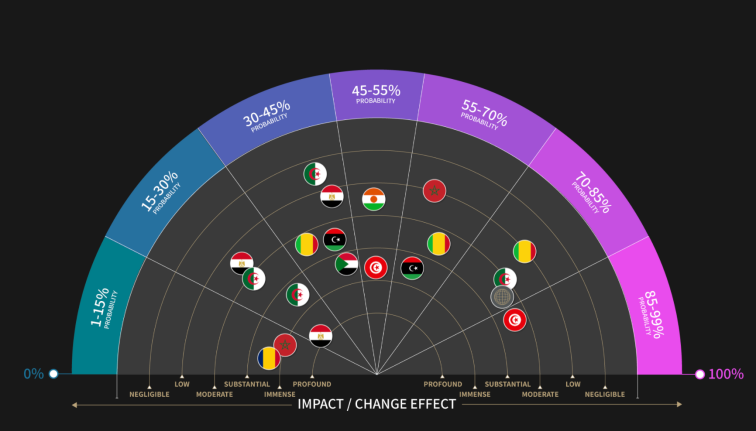


Key indicators

Military exercises and deployments to borders
There are a few developments that would suggest risks of direct inter-state armed conflict over disputed issues including the GERD, Western Sahara and Libya are rising. They include Ethiopia alleging that Egypt is directly engaged in its civil conflict, a cross-border attack in Morocco or Algeria resulting in civilian casualties, and large numbers of Libyan fighters moving eastwards towards Egypt. On the other hand, moves towards regional reconciliation including a resumption of negotiations over the GERD and Morocco-Algeria upgrading their diplomatic relations would signal that inter-state conflict risks are falling further.
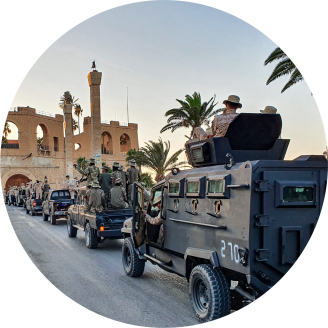
Fragile stability in Libya
There are several political and military developments that we anticipate would signal that the fragile political process in Libya is likely to imminently break down and result in a resumption of civil conflict. These include armed attacks or violent protests against the electoral authorities in the aftermath of the December 2021 vote and political factions withdrawing from cabinet or the process to form that. We will also be monitoring for softer indicators that point to domestic and international concern about a potential collapse. These include political figures relocating abroad, people moving their money abroad, and crisis meetings by UN and regional diplomats.
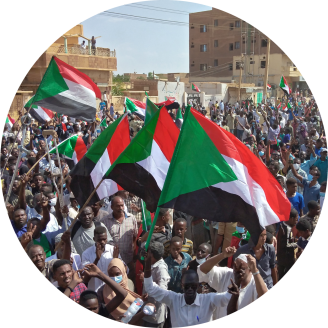
Destabilising protests against military authorities in
Mali and Sudan
With ongoing political transitions in Mali and Sudan we will be monitoring several indications that civil-military relations are deteriorating significantly. These would portend a heightened and imminent risk of another coup or other major political crisis. Large-scale, violent protests that are disruptive to day-to-day life in Khartoum and Bamako over several weeks would be particularly likely to lead the armed forces or a faction of them to intervene. As well as hardship and serious delays to the transitional timetable, a mass-casualty incident, such as a cross-border attack, communal violence or a major terrorist attack that highlights security failings would be particularly likely to trigger such unrest.
North Africa
End of Ramadan
1 May
Tunisia
Anniversary of revolution
14 January
Egypt
Anniversary of the start of 2011 protests
25 January
Algeria
Anniversary of the start of 'Hirak' protest movement
22 February
Mali
Legislative and
presidential elections
27 February
Algeria
Arab League Summit
March
North Africa
Annunciation Day
25 March
North Africa
Earth Day
22 April
North Africa
Start of Ramadan
2 April
Niger
Concord Day - Commemorating 1995 peace accord signing.
24 April
Sudan
Anniversary of overthrow of Omar Al-Bashir
11 April
North Africa
Eid Al-Fitr
2 May–3 May
Egypt
Anniversary of overthrow of Mohamed Morsi
3 July
North Africa
Eid Al-Adha
9 July
North Africa
Ashura
7 August–8 August
Algeria
Anniversary of start of war
of independence
1 November
North AFRICA
Rainy season
November–March
Morocco
Anniversary of the Green March to Western Sahara
6 November
Egypt
COP27 in Sharm El Sheikh
7 November –18 November
North Africa
African Union Summit
Before December
Tunisia
Francophonie Summit
in Djerba
Before December
North Africa
Orthodox Christmas Eve
6 January
The power
of generals
The militaries of the region will play a central role in determining the political and security outlook in North Africa in 2022. The region faces multiple challenges with continuing instability and insecurity, particularly in Libya, Sudan and across the Sahel.
The outlook for economic recovery for those countries is strongly negative. For the rest, the lingering impacts of the pandemic and associated contractions in key sectors such as hydrocarbons and tourism means their recoveries are highly vulnerable to setbacks, such as renewed Covid-19 outbreaks.
The economic toll of the pandemic on the region is highly significant in terms of stability and security risks, and the potential for governance-induced crises over the long term. The economic resilience of all countries, including Egypt, its highest performer in terms of GDP growth, has diminished. The average fiscal deficit for Egypt, Libya, Tunisia, Algeria, Morocco and Mauritania, as the region’s leading economies, has doubled. This renders them vulnerable to social discontent and gives governments few means to redress grievances.
Compounding these challenges is the likely inability of civilian governments to exert influence over powerful military and security agencies in most countries in 2022. There appear to be scant prospects for democratic reform across North Africa, even if there are moves to liberalise economic sectors as seems likely, for example in Algeria. This deepening authoritarianism and the protection of vested military interests suggest any threats to stability will be robustly dealt with under the pretext of necessary measures to recover the economy. >>
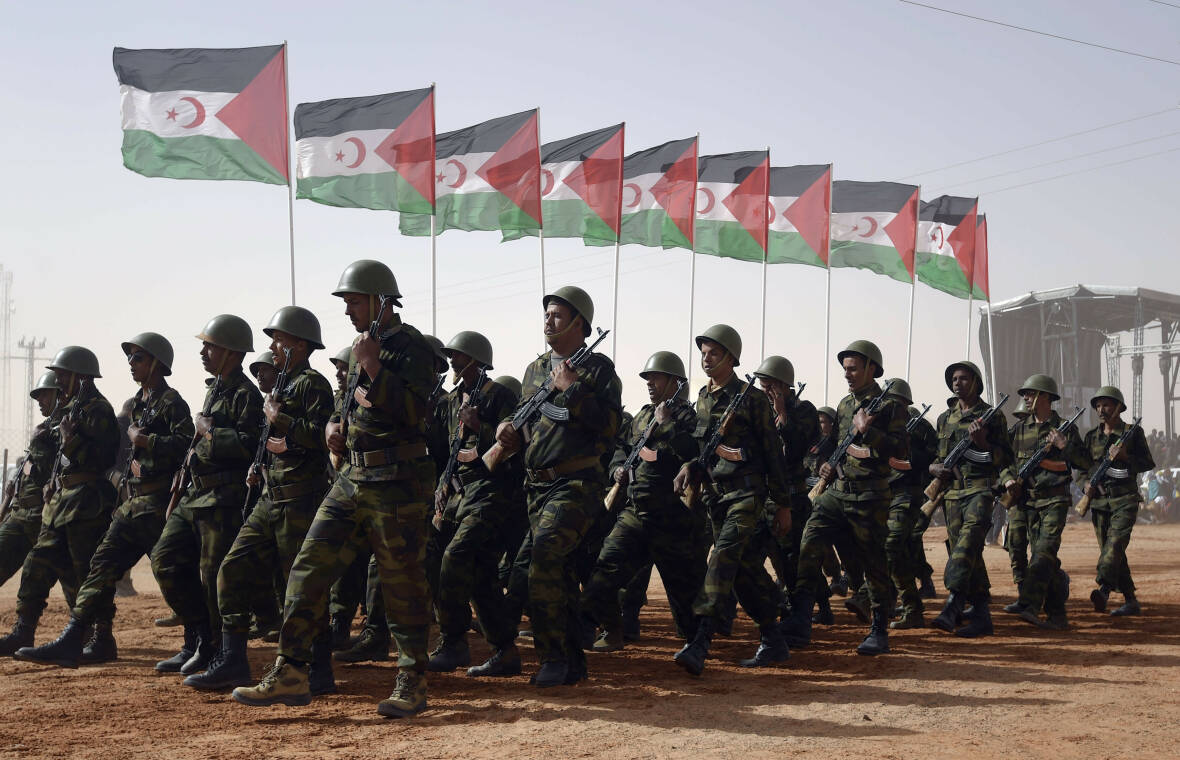
Images: Getty Images (Ryad Kradmdi/AFP; Faroul Batiche/AFP; Fadel Senna; Mahmud Turkia; AFP)
History repeating itself

